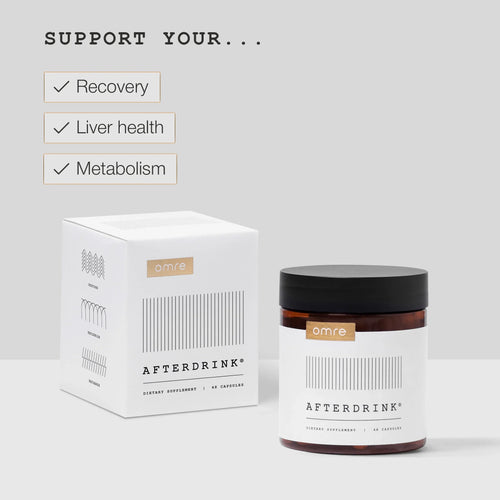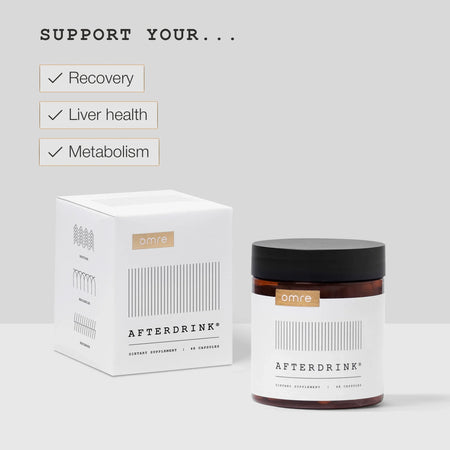Table of Contents
"Congeners" are the biologically active compounds (other than ethanol) that are found in alcoholic drinks.
There are lots of different types of congeners and they include esters, tannins, methanol, and sulfites to name a few.
The science of hangovers is complicated and scientists believe that lots of different factors are involved. More recently, studies have proven that congeners are one of the reasons why we get hangovers.
But what exactly are congeners and how do they make hangovers worse?
In this article, we’re going to cover everything you need to know about congeners and what you can do to avoid them.
AFTERDRINK®
A supercharged antioxidant designed to support recovery, made from the very best, research-backed ingredients on the market.*
What are congeners?
Congeners are biologically active compounds that are naturally formed when alcohol is manufactured. More specifically, they are formed during the fermentation and aging processes.
They are responsible for the taste and aroma of alcoholic drinks. But several studies have shown that congeners can make hangover symptoms worse.(1)
"Congener" is an umbrella term. By that we mean there are several different compounds that belong to this group. These include:
Methanol
Methanol looks and smells very similar to pure spirit alcohol we drink (ethanol). However, it is far more toxic and dangerous.
Methanol is toxic by two mechanisms. Firstly, it has powerful sedating effects on your central nervous system. Secondly, it is metabolized by your liver to produce formaldehyde and formic acid which are highly toxic.
There have been many cases of methanol poisoning reported in the media from homemade and dodgy manufacturers of alcohol. Thankfully, however, the amount of methanol in trusted brands is negligible and doesn't cause problems.
That being said, even very small amounts of methanol can exacerbate hangover symptoms.
Aldehydes and esters
Aldehydes and esters are highly volatile substances found in small quantities in alcohol. They contribute to the smell and taste of alcoholic drinks.
They are "biologically active" meaning they interact with other compounds and cells. In some cases, they can trigger inflammatory pathways.
Acetone
You’re probably more familiar with acetone as nail polish remover. But It’s another substance produced as a by-product of alcohol fermentation.
Tannins
You've probably heard of tannins in relation to wine. T
On one hand, tannins are thought to be beneficial to health as they act as antioxidants and protect cells from free radical damage.
On the other hand, tannins are thought to contribute to the classical headache associated with drinking red wine.
The theory is that tannins stimulate the release of histamine and serotonin which can trigger hangover headaches.
Which type of alcohol has the most congeners?
Generally speaking, darker-colored drinks have the highest concentration of congeners. Whereas filtered and purified spirits such as vodka and gin have the lowest. In fact, Bourbon has 37 times more congeners than vodka!
Alcohol that has been aged in barrels will have significantly more congeners because they continue to form and accumulate over the years.
Conversely, vodka is usually filtered several times before the final product is released which clears a lot of the impurities and congeners.
How do congeners make hangovers worse?
We’ve mentioned four of the main congeners that are found in alcohol earlier in this article. There are a few others also that we didn’t go into such as heavy metals like lead and other organic molecules.
The fact that there are so many different types makes it difficult to carry out research into each individual congener.
To complicate matters, there are big differences in congener concentration between different types of alcoholic beverages. For example, different types of whiskey (bourbon, brandy, Scotch, American, Canadian) all have very different concentrations of congeners.
The only research so far has shown that drinks with higher congeners always lead to more severe hangovers. For example, a study compared bourbon with vodka and found that overall, those given bourbon had more intense hangovers.
It's thought that because congeners are biologically active, they interact with our cells and fuel inflammatory processes.
AFTERDRINK®
A supercharged antioxidant designed to support recovery, made from the very best, research-backed ingredients on the market.*
Are congeners bad for you?
In small quantities, the damage caused by congeners is negligible. After all, they are responsible for all the flavors we love so getting rid of them defeats the purpose!
A high concentration of methanol is by far the most dangerous of the congeners. Thankfully, however, if you stick to legitimate brands, you’re unlikely to have any problems.
Some congeners like tannins even have beneficial effects as it acts as an antioxidant.
Anything else to consider?
Hangovers are a sign from your body that you’ve been drinking too much for your liver to handle.
Congeners are just one of several different reasons why we get hangovers. These include:
- Dehydration
- Sleep disturbance
- Hormonal imbalance
- Direct toxin effect of alcohol
If you drink enough of any type of alcohol, including ones low in congeners, you will still wake up with a bad hangover.
The best way to prevent a hangover is to drink less alcohol, avoid drinking on an empty stomach, and keep well hydrated.
Congeners in alcohol: Final words
That brings us to the end of our look into congeners and how they increase the severity of hangovers.
Congeners are natural by-products formed during the manufacturing process of alcohol. And darker-colored drinks naturally contain a higher concentration of congeners.
It's the reason why whiskey and wine hangovers are the worst!





